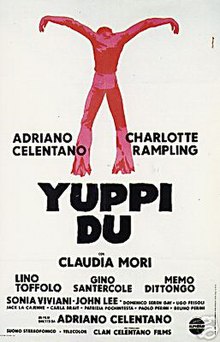Yuppi du
| Yuppi du | |
|---|---|
 Film poster | |
| Directed by | Adriano Celentano |
| Written by | Adriano Celentano Alberto Silvestri |
| Starring | Claudia Mori, Adriano Celentano |
| Cinematography | Alfio Contini |
| Edited by | Adriano Celentano |
| Music by | Adriano Celentano |
Release date |
|
Running time | 120 minutes |
| Country | Italy |
| Language | Italian |
This article is a rough translation from Italian. It may have been generated by a computer or by a translator without dual proficiency. |
Yuppi du is a 1975 Italian comedy film directed by Adriano Celentano. It was entered into the 1975 Cannes Film Festival.[1]
Plot[]
Felice Pietà is a man of modest means who lives with his second wife, Adelaide. Together, they raise Monica, a daughter Felice had with his first wife Silvia, who had committed suicide years before.
Having never really accepted the loss of Silvia, Felice decides to visit the place where his ex-wife had taken her own life one last time. There, to his surprise, Silvia reappears, and reveals to him that she left because she was tired of living in poverty with him. Felice leaves Adelaide to start a new life with Silvia.
When Silvia decides to leave for London to clear things up with her husband, Felice proposes to bring his daughter. Silvia therefore parts, but does not return. Only after a few months Felice learns where he lives Silvia, along with Monica. Reaches them then to Milan, where the rich husband of Silvia emphasizes the protagonist legal difficulties he would face in trying to get back her daughter. At this point, Felice - using the same logic "market" - suggests the sale by weight of Monica. Silvia's husband tries to haggle over weight, and eventually pay 45 million for the child. On the return trip by train to Venice, Felice meets a woman the same as Silvia. The silent dialogue takes place through voiceovers of the characters (as has happened elsewhere in the film): the promise of eternal love and happiness made by the woman, Felice says she can not believe more love and know that in reality 'sole purpose of her is to take away his money.
In the film, several subplots are also important, related the story of the violence suffered by Napoleon's girlfriend, to death by accident on the work of Scognamillo, as well as several found visual, narrative, comedy.
Cast[]
- Claudia Mori as Adelaide
- Charlotte Rampling as Silvia
- Gino Santercole as Napoleone
- Adriano Celentano as Felice Della Pietà
- as Monica
- as The Maid
- as Scognamillo
- John Lee
- Carla Mancini (credit only)
- Lino Toffolo as Nane
- Sonia Viviani as Napoleone's girl
- as Man in the toilet (uncredited)
- Pippo Starnazza as Old man in Milan bar (uncredited)
References[]
- ^ "Festival de Cannes: Yuppi du". festival-cannes.com. Retrieved 4 May 2009.
External links[]
- 1975 films
- Italian-language films
- 1975 comedy films
- Italian films
- Italian comedy films
- 1970s Italian-language films
- Films directed by Adriano Celentano
- 1970s Italian comedy film stubs